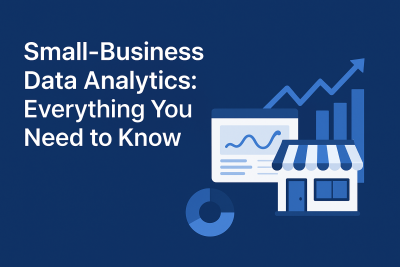
SOPHIA OLISE
 Data Analysis
Data Analysis
 0 comment
0 comment
 15 Aug, 2025
15 Aug, 2025

Data analytics is now a game-changer for small businesses, helping them move from guesswork to evidence-based decision-making. By leveraging their own data, a local café or online boutique can understand their customer base as deeply as a large corporation, allowing them to optimize operations, reduce waste, and build lasting customer loyalty.
From identifying sales trends to forecasting customer demand, data analytics enables small-business owners to respond quickly to changes in the market. This ability to adapt not only keeps them competitive but also positions them to seize opportunities before others do.
Top 5 Places to Learn Data Analysis Online in Nigeria: Prices and Courses
Top 10 High-Paying Jobs Involving Data Analysis in 2025
Step 1 – Define Your Goals: Start with a clear question. Is your goal to reduce marketing spend? Then your focus should be on marketing ROI metrics. Do you want to increase customer loyalty? Focus on metrics like repeat purchase rate and customer lifetime value.
Step 2 – Collect the Right Data: Don't collect data just for the sake of it. Use your goals to guide your data collection. For customer loyalty, gather data from loyalty programs, customer feedback forms, and email click rates.
Step 3 – Choose the Right Tools: Starting with Microsoft Excel is often the best choice for small businesses. It's already familiar and powerful enough for initial analysis. As your needs grow, you can explore more specialized tools. Google Looker Studio is excellent for creating shareable, real-time dashboards from data sources like Google Analytics and social media.
Step 4 – Analyze and Interpret: This step involves more than just looking at numbers. A small business owner should look for relationships between different data points. Does a marketing email on a Tuesday lead to more sales? Do customers who buy one product also tend to buy another?
Step 5 – Take Action and Monitor: The analysis is useless without action. Based on your insights, make a change—like offering a specific product bundle—and then use the data to measure its impact. This creates a continuous cycle of improvement.
Microsoft Excel – Ideal for basic reporting, calculations, and trend analysis.
Google Looker Studio – Free, cloud-based, and perfect for small-scale analytics.
Zoho Analytics – Affordable business intelligence solution tailored for SMEs.
Tableau Public – Offers strong data visualization capabilities for public dashboards.
QuickBooks – Best for financial tracking and accounting-related analytics.
Future Trends in Small-Business Data Analytics
AI-Powered Insights: Automation will make analysis faster and more accurate.
Cloud-Based Tools: Accessible anywhere, ensuring flexibility for mobile and remote work.
Integrated Business Platforms: Centralized systems will merge accounting, sales, inventory, and marketing data into one dashboard.
Final Recommendations
Data analytics has become a necessity for small-business growth and sustainability. The key is to start small, focus on the most important metrics, and gradually adopt more advanced tools and techniques. By doing so, businesses can become more efficient, customer-oriented, and financially resilient. Turn Your Small Business Data into Big Wins! Don’t just collect data—use it to grow your business. At ECR Academy, we help small business owners like you understand sales trends, customer behavior, and financial performance using simple, practical analytics tools. Whether you want to reduce costs, boost sales, or make smarter decisions, ECR Academy’s Data Analytics Training & Services are designed to help you succeed. Start your data-driven journey today with ECR Academy!
Frequently Asked Questions
1. What is the best data analytics tool for small businesses?
Microsoft Excel and Google Looker Studio are excellent starting points.
2. Can small businesses afford data analytics?
Yes. Many tools are free or budget-friendly, and the long-term returns outweigh the costs.
3. How often should I analyze my business data?
Monthly reviews are suitable for most businesses, but weekly tracking is ideal in fast-changing industries.
4. What kind of data should I collect?
Sales, customer feedback, marketing performance, and inventory data are essential.
5. Do I need to hire a data analyst?
Not necessarily. Many tools are designed for beginners and require minimal technical expertise.
SOPHIA OLISE
Data Analyst
Olise Sophia Amarachi is a passionate and purpose-driven data analyst and digital skills advocate based in Nigeria. With a strong foundation in Excel, Power BI, and SQL, she empowers others—especially young people and corps members—through practical training, tech mentorship, and values-based leadership. Sophia’s journey into data analysis began during her NYSC year in Abia State, where she committed herself to learning and growing from scratch. Today, she shares her knowledge through online classes, challenges, and hands-on projects, including dashboards and reports that translate complex data into clear insights.
0 comment